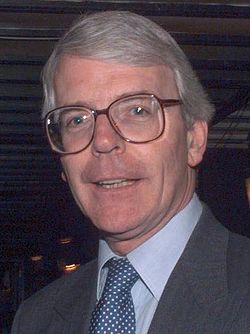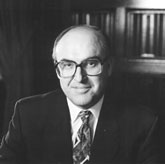
1993 vote of confidence in the government of John Major
Encyclopedia

Conservative Party (UK)
The Conservative Party, formally the Conservative and Unionist Party, is a centre-right political party in the United Kingdom that adheres to the philosophies of conservatism and British unionism. It is the largest political party in the UK, and is currently the largest single party in the House...
government of John Major
John Major
Sir John Major, is a British Conservative politician, who served as Prime Minister of the United Kingdom and Leader of the Conservative Party from 1990–1997...
which was proposed in order to ensure support in Parliament for the passing of the Maastricht Treaty
Maastricht Treaty
The Maastricht Treaty was signed on 7 February 1992 by the members of the European Community in Maastricht, Netherlands. On 9–10 December 1991, the same city hosted the European Council which drafted the treaty...
. Due to previous defeats caused when eurosceptic
EuroSceptic
EuroSceptic is the second album of British singer Jack Lucien. It was released in October 2009.Due to being an album influenced by Europop, it features songs with parts in different languages...
Conservative MPs voted with the opposition, the Government had to obtain support for its policy on the Social Chapter before the European Communities Amendment Act 1993 could come into effect and allow the United Kingdom to ratify the treaty. Dissenting Conservative MPs were willing to vote against the Government but had to come into line on a confidence motion or else lose the Conservative whip. Only one eurosceptic MP was deliberately absent and as a result the motion passed by 40 votes and the United Kingdom ratified the Maastricht Treaty.
European Communities Amendment Bill
At Maastricht, John Major had negotiated a treaty which allowed the European Union to develop, but with the United Kingdom opting out of the 'Social Chapter' provisions on employment law. The opt out was strongly opposed by the LabourLabour Party (UK)
The Labour Party is a centre-left democratic socialist party in the United Kingdom. It surpassed the Liberal Party in general elections during the early 1920s, forming minority governments under Ramsay MacDonald in 1924 and 1929-1931. The party was in a wartime coalition from 1940 to 1945, after...
opposition, although it supported the treaty as a whole. The treaty itself was opposed by a minority of Members of Parliament in both main parties who were termed eurosceptic
EuroSceptic
EuroSceptic is the second album of British singer Jack Lucien. It was released in October 2009.Due to being an album influenced by Europop, it features songs with parts in different languages...
s due to their concern at the way the European Communities had developed as an institution.
As the Maastricht Treaty
Maastricht Treaty
The Maastricht Treaty was signed on 7 February 1992 by the members of the European Community in Maastricht, Netherlands. On 9–10 December 1991, the same city hosted the European Council which drafted the treaty...
increased the powers of the European Communities, an Act of Parliament
Act of Parliament
An Act of Parliament is a statute enacted as primary legislation by a national or sub-national parliament. In the Republic of Ireland the term Act of the Oireachtas is used, and in the United States the term Act of Congress is used.In Commonwealth countries, the term is used both in a narrow...
was needed to ratify it. The Government introduced the European Communities Amendment Bill almost immediately after the general election
United Kingdom general election, 1992
The United Kingdom general election of 1992 was held on 9 April 1992, and was the fourth consecutive victory for the Conservative Party. This election result was one of the biggest surprises in 20th Century politics, as polling leading up to the day of the election showed Labour under leader Neil...
in June 1992. As the Bill affected the constitution
Constitution of the United Kingdom
The constitution of the United Kingdom is the set of laws and principles under which the United Kingdom is governed.Unlike many other nations, the UK has no single core constitutional document. In this sense, it is said not to have a written constitution but an uncodified one...
, its committee stage had to be taken in a Committee of the Whole House. Eurosceptics who opposed the treaty put down hundreds of amendments and the Committee stage lasted from 1 December 1992 to 21 April 1993; at the end the Government accepted new clause no. 74 proposed by the Labour front bench which required an explicit vote by both Houses of Parliament on a Government motion "considering the question of adopting the Protocol on Social Policy" before the Act could be implemented. Labour spokesman on Europe George Robertson
George Robertson, Baron Robertson of Port Ellen
George Islay MacNeill Robertson, Baron Robertson of Port Ellen, is a British Labour Party politician who was the tenth Secretary General of the North Atlantic Treaty Organisation, between October 1999 and early January 2004; he succeeded Javier Solana in that position...
described the new clause as a 'ticking time bomb' under the Government.
Government Defeat
The European Communities Amendment Bill successfully passed through its Parliamentary stages and received Royal AssentRoyal Assent
The granting of royal assent refers to the method by which any constitutional monarch formally approves and promulgates an act of his or her nation's parliament, thus making it a law...
on 20 July 1993, with new clause 74 having become section 7 of the Act. The Government then scheduled a debate in the House of Commons on 22 July on a motion under section 7; at Prime Minister's Question Time on 20 July Major gave the impression that he would ratify the treaty even if the Government lost the vote, because Parliament had approved the treaty he signed.
The motion debated on 22 July declared:
The Labour front bench moved an amendment to change the motion to:
After a long and at times acrimonious debate, the Labour amendment was voted on first and the result was dramatically announced as a tie with 317 MPs voting in favour and 317 MPs voting against. The Speaker
Speaker of the British House of Commons
The Speaker of the House of Commons is the presiding officer of the House of Commons, the United Kingdom's lower chamber of Parliament. The current Speaker is John Bercow, who was elected on 22 June 2009, following the resignation of Michael Martin...
, Betty Boothroyd
Betty Boothroyd
Betty Boothroyd, Baroness Boothroyd, OM, PC is a British politician, who served as Member of Parliament for West Bromwich and West Bromwich West from 1973 to 2000, initially for the Labour Party and, from 1992 to 2000, as Speaker of the House of Commons...
gave her casting vote
Casting vote
A casting vote is a vote given to the presiding officer of a council or legislative body to resolve a deadlock and which can be exercised only when such a deadlock exists...
against the amendment. (It was later discovered that there had been a miscount of those supporting the motion and that one more had been counted in its support than had actually voted, so that the amendment had actually been defeated by one vote.) After the amendment was voted down, the Government motion was put to the vote and lost by eight votes, 316 in favour and 324 against.
The Confidence debate

Dissolution of parliament
In parliamentary systems, a dissolution of parliament is the dispersal of a legislature at the call of an election.Usually there is a maximum length of a legislature, and a dissolution must happen before the maximum time...
." The Leader of the Opposition John Smith was said to be "on top form", making several jokes at the expense of Major whom he likened to a cricketer being forced to follow-on
Follow-on
Follow-on is a term used in the sport of cricket to describe a situation where the team that bats second is forced to take its second batting innings immediately after its first, because the team was not able to get close enough to the score achieved by the first team batting in the first innings...
after being clean bowled. Smith described the "quasi-motion of confidence" as "not a sign of confidence, but a display of weakness".
The opposition front bench amendment requiring the Government to remove its opt out from the Social Chapter was voted down by 301 to 339, and the Government motion was then agreed by 339 to 299. Examining the lists of MPs who had voted disclosed one Conservative MP who had been absent and not voted: Rupert Allason
Rupert Allason
Rupert William Simon Allason is a military historian and former Conservative Party politician in the United Kingdom. He was the Member of Parliament for Torbay in Devon, from 1987 to 1997...
, Member for Torbay
Torbay (UK Parliament constituency)
-Elections in the 2000s:-Elections in the 1990s:-Elections in the 1980s:-Notes and references:...
was subsequently found to have left the country on the Wednesday. Allason admitted he ought to have returned for the vote and wrote to the Prime Minister to apologise, but for his failure to support his party Allason had the Conservative Party whip
Whip (politics)
A whip is an official in a political party whose primary purpose is to ensure party discipline in a legislature. Whips are a party's "enforcers", who typically offer inducements and threaten punishments for party members to ensure that they vote according to the official party policy...
suspended.

